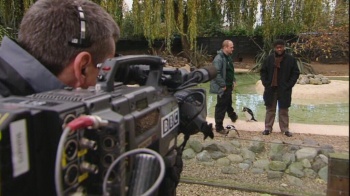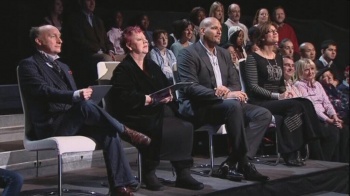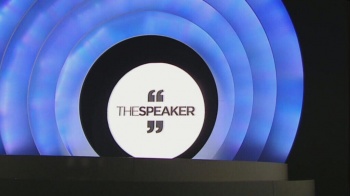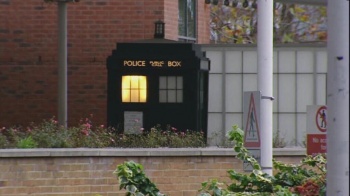Weaver's Week 2009-05-10
UKGameshows (Talk | contribs) |
m (1 revision) |
Current revision as of 13:58, 22 December 2009
Last week | Weaver's Week Index | Next week
Contents |
The Speaker
BBC2 (credited to BBC Manchester), 7-29 April
At times, it really does feel as though the UK entertainment industry is regressing to the inter-war years. We've seen a revival of the Spelling Bee, the touring talent show is making a huge splash, and now we're being presented with young people who wish to impress us with their powers of oratory. See how good they are at public speaking.
It was an eight-episode series: the first two episodes were a ceaseless barrage of faces in inevitable audition shows. We started watching properly at episode four, when the applicants were down to eight, and we could actually remember their names. We deliberately didn't see episode six, for reasons we'll get to later.
The show set out its stall in the opening titles: words like "confidence" and "motivation" rose into the air, as though someone had a business jargon manual and let the contents rise with the heat of its own self-importance. It was never really clear what the contestants were being judged on: the criteria changed from one episode to the next, and often within each episode. Perhaps the best way to illustrate this is to go through one episode, and episode 5 springs to mind.
It's the one where the competitors are going off to give an hour of cross-promotional pluggery to BBC News. Er, we mean, learn valuable lessons in the art of public speaking from Kate Silverton and her colleagues in the newsroom. On arrival, the seven candidates are introduced to a producer chappy, given some facts to learn, and asked to deliver them in a piece to camera lasting exactly 30 seconds. No longer, no shorter.
The piece has to be interesting and lively. There are facts written down for the youngsters, but there are far more facts than they'll have time to fit in, and they're on their own when it comes to structuring a coherent narrative. There were similarities to a test in the previous show, when they had eight minutes to guide a coach party round a room in a stately home. It's selecting the most important facts to include, the most vibrant information, and conveying it in a way that doesn't leave the audience longing for the next item.
That task was recorded and played back, and everyone received some harsh but fair comments from the producer. Critical examination is a difficult skill to master, perhaps the one that most clearly separates the mature from the child, and it was encouraging to see the contestants took suggestions for improvement in that spirit. We can compare and contrast against the hissyfits thrown on The Apprentice. Though not on Election, the junior version shown last year. How come twelve-year-olds are more mature than city slickers? Answers on a postcard...
Back to The Speaker, and we found the contestants at London's famous London Zoo. They were preparing for a live two-way link with Matthew Amroliwala in the BBC News studio, and they had to contend with all the chatter from the production gallery as well as introducing the piece and conducting an interview. And, just for good measure, engaging in unprepared and unscripted banter from the studio at the end of their piece. It was a difficult and demanding job, and we were very pleasantly surprised at how well all the contestants fared. Not all of them were up to the high standards of BBC national news, not all of them were up to the lower standards of some other news channels, but we reckon that all the pieces would have been intelligible to the viewer at home.
Kate Silverton has been with the contestants during this second challenge, and she decided which three had fared the worst at this live interview. Those three would have to appear on stage, in front of Ms Silverton and the show's regular panel – Jo Brand the comedian, Jeremy Stockwell the drama coach, and John Amaechi the basketball player. The three contenders were each asked to prepare a speech on a topic of the producers' choice; the least convincing of those three pieces left.
And thus the show ended, leaving six to fight on another day. While all these challenges were valuable exercises in verbal communication, we couldn't detect a particularly strong thread running through them. Was the show looking for a great salesman, a first-class journalist, a storyteller, an aspiring politician, something else entirely? We never quite worked out what made The Speaker tick, and that's a terrible flaw in a programme. Staging a competition for its own sake just about works when it involves people who are already famous (see, for instance, Superstars) or when there's a coherent narrative (say, Wanted). We found it very difficult to get enthused here.
Perhaps that's because we'd seen much of it before. As we alluded earlier, The Speaker was straddling the middle ground between self-promotional series The Apprentice and children's leadership show Election. Those two shows are tightly plotted, with a clear objective to each part of the programme. The Speaker was more nebulous.
In part, that cloudiness arose because judging the nuances of public speech is very difficult, and almost entirely subjective. We can tell a brilliant speech when we hear it, we can tell a lousy speech when we hear it, but trying to split the difference between two merely-decent speeches is a very tough task. It's made even more difficult for the viewer at home because we generally only got to hear small extracts of longer speeches – the eight-minute presentations in the stately home were generally edited down to two minutes for the screen.
We also found ourselves questioning the credibility of the panel: Ms Brand tries to be funny and rarely succeeds. Mr. Stockwell was someone we had never heard of, but turned out to be a performance expert from RADA. Mr. Amaechi we only know through his sporting prowess. The producers were right to keep politicians off the panel, but they might have introduced a toastmaster, a campaigner, a raconteur, someone who has made most of their fame through public speaking. Was Gyles Brandreth's fee really so high? We also found Jane Horrocks to be a strange choice to narrate the programme: she has a squeaky voice, and a weak voice, one that just felt wrong for the production. Perhaps the biggest advantage was that we couldn't confuse the narrator with any other contributor.
It felt as though it was a chance for the BBC to cross-promote – as well as News 24, there was a programme given over to Dragons' Den – and to pull in some star guests. We'll give a pass to Lord Spencer, he has delivered a rather famous speech, but the appearance of Alistair Campbell had us reaching for the off-switch. We remember when Mr. Campbell gloated after causing the removal of the BBC's chairman and chief executive, and now he expects to be treated as an expert in something other than being odious.
Overall, we found The Speaker to be a very flat programme. After some characters started to emerge in the second week of transmission, we began to form our own opinion of potential winners, and our remarkable ability to back a loser remains unchanged. We never found ourselves getting excited, we had no particular emotional stake in the outcome. That is not a winning formula.
Mastermind
Second round 2
After a ten-zillion year break, we're back on the road that leads straight to the grand final. Nothing can now stop us from crowning the 2008 Mastermind champion. Here are the next four contenders.
Nancy Dickmann will tell us about the Life and German Films of Fritz Lang. As the subject might have hinted, Herr Lang was a German-language filmmaker, born in Vienna and responsible for such masterpieces as "Die Nieberlungen" and "Metropolis". It's a perfect round of questions, 16 (0).
Sally Jones is up next, she's taking the Life and Career of Billie Jean King. It's no secret that Mrs. Jones is a professional sports journalist – she's the inspiration for Private Eye character "Sally Jockstrap" – and her subject was a hugely successful professional tennis player in the 1970s. Though she doesn't quite remember how many zillion matches Miss King played, she does well enough to score 14 (0).
Ara Varatharaj will discuss Private Eye magazine from 1990. The satirical magazine was founded by Lord Gnome in 1961, and continues to mix hard-hitting investigative journalism (usually resulting in libel writs from Robert Maxwell) with some incisive topical comedy. The questions tend to concentrate on the funnies, which isn't really the point of the magazine, and the contender ends on 5 (8).
Nicholas Flindall is last up, and he's got the Life of Robert Maxwell. Born Jan Hoch in Czechoslovakia, Maxwell founded Pergammon press, represented Buckingham in the Commons for six years, had a radio series of half-hour talks, bought the Daily Mirror, robbed the pension fund, and was found floating in the Med in November 1991. His final score is 10 (3).
Mr. Varatharaj got here by discussing the Challenger novels of Conan Doyle, where he scored 16 points on his specialist round. He does well, this is emphasised by the host, and finishes on 17 (10).
Mr. Flindall took Len Deighton in the last round. The host now claims that it's a complete coincidence that Mr. Maxwell and Private Eye crop up in the same week. Yeah. The round is at least as much hit as miss, and ends on 16 (7).
Sally Jones got here with the short stories of Saki. Billie-Jean King was a lively and athletic player, it's entirely arguable that she turned the game from a pursuit for gentlewomen into a proper athletic spectacle. We might have that impression because the BBC resolutely refuses to show matches from the 1960s when it rains at Wimbledon (ie all the time). Any contender who knows her Kattegat from her Skaggerat deserves our respect; she ends on 24 (3)
Nancy Dickmann – who took "Amelia Peabody" – was very impressive on her last appearance. We're told that Herr Lang was "awful" to work with, and was quite prepared to push actors down stairs until he got the shot he wanted. The contender needs nine to win, and gets off to a good start, remembering Anthony Stewart-Head's other memorable role, not counting the coffee commercial. It's the beginning of another stupendous round, finishing on 28 (0).
And guess what! There's no show next week! Mastermind is replaced by an hour-long investigative documentary, Who Killed the Honey Bee. There's now very little margin for error lest the show run into London's tennis tournament.
This Week And Next
We regret to report the death of Tom Heald, trivia buff, journalist, and curator of the TV or Not TV website and mailing list. Tom was best known for authoring the Remote Patrol, a daily email listing what was on that night's television, quite deliberately playing to the show's weaknesses. For instance, this was his billing for an episode of Pop Idleus earlier this year:
- "Adam Lambert performs "Singing in the Rain" in the style of Insane Clown Posse while Danny Gokey sings something involving Jesus."
Heald was a particular fan of game shows, and always demonstrated that he understood what made television that people could relate to. His ready wit and clarity of perception were skills that this column could only dream of emulating. Tom Heald died last Monday, aged 37. TV or Not TV's obituary.
Terry Wogan addressed the EBU's annual meeting in Luzern this week. Mr. Wogan mostly spoke about the EBU's annual Song Contest, and made his usual xenophobic, small-minded, patronising, and factually incorrect tosh. "Everybody knows it's rubbish," claimed the commentator, who would have changed his tune if only he had actually bothered to listen to "Lane moje" instead of rabbiting on over the top of it. Anyway, the good news is that for the first time since 1973, this year's Eurovision Song Contest will be a Wogan-free zone. The only veteran Irishman there will be Larry Grogan, giving a lucid and factual account for his audience.
Is it just us, or is Beat The Star With Vernon Kay becoming rather repetitive? We can tolerate a lot of repeats from last year: the hammering nails into a piece of wood was good in small doses, and there's nowt wrong with a bout of football in a cage. But to see the same ladder-climbing game twice in two weeks is taking the whotsit. The balance is too heavily tilted towards physical challenges, there's only perhaps two games of a vaguely cerebral bent each show. Should Do Better.
BARB ratings for the week to 25 April are in. Britain's Got Talent had another series-high, 13.2m saw Saturday's show, eclipsing the 8.3m who saw The Apprentice, plus 3.45m for the winner's interview. 6m for HIGNFY on BBC1, plus 2.2m for the longer BBC2 edit. Hell's Kitchen had 5m, Beat the Star With Vernon Kay 4.25m, and Tonight's the Night 4.05m. Come Dine With Me had a year's best score, 2.9m saw the cookery challenge in the Isle of Wight.
BGT also ran away with the digital tier, 1.49m saw the auditions, 1.05m the narrative repeat, both on ITV2. Come Dine With Me still mustered 900,000. Pop Idleus (ITV2, 460,000) is twice as popular as Total Wipeoutus (UKTV Watch, 235,000). Argumental returned to UK G2TV Dave+1, and was seen by 260,000.
It's the grand final of Shipwrecked (C4, 12.15 Sunday), and someone will win a life-changing amount of money. In It to Win It comes to Challenge (9pm weekdays). Oh, and it's Eurovision week. The semi-finals are live on BBC3 and RTE2 (Tuesday and Thursday, 8pm), and there's another chance to see the BBC's documentary on the contest's formative years (UKTV Watch, 8pm Friday). We'll have our traditional review of all the semi-finalists when we publish next week's Week on Saturday.
To have Weaver's Week emailed to you on publication day, receive our exclusive TV roundup of the game shows in the week ahead, and chat to other ukgameshows.com readers sign up to our Yahoo! Group.









